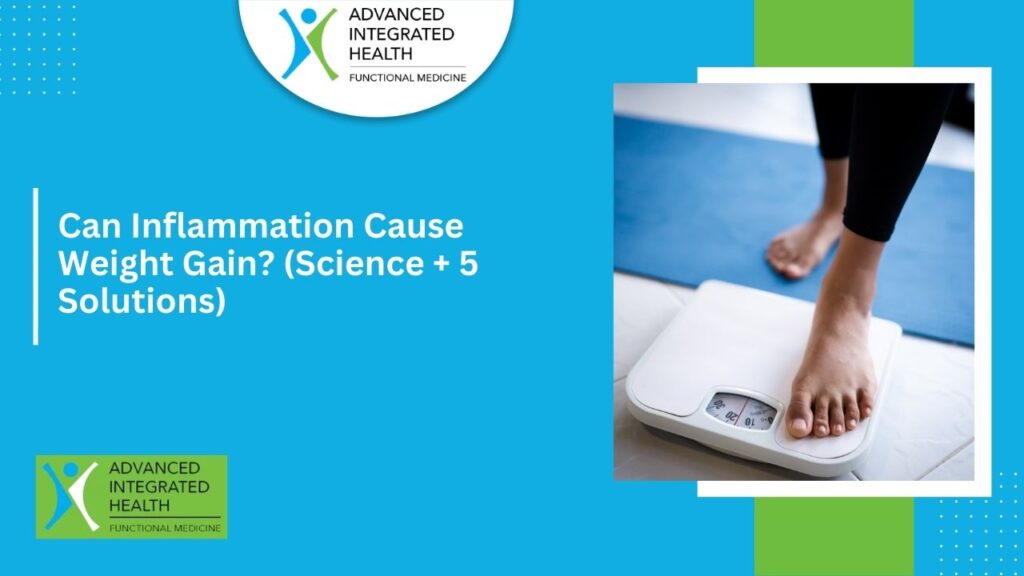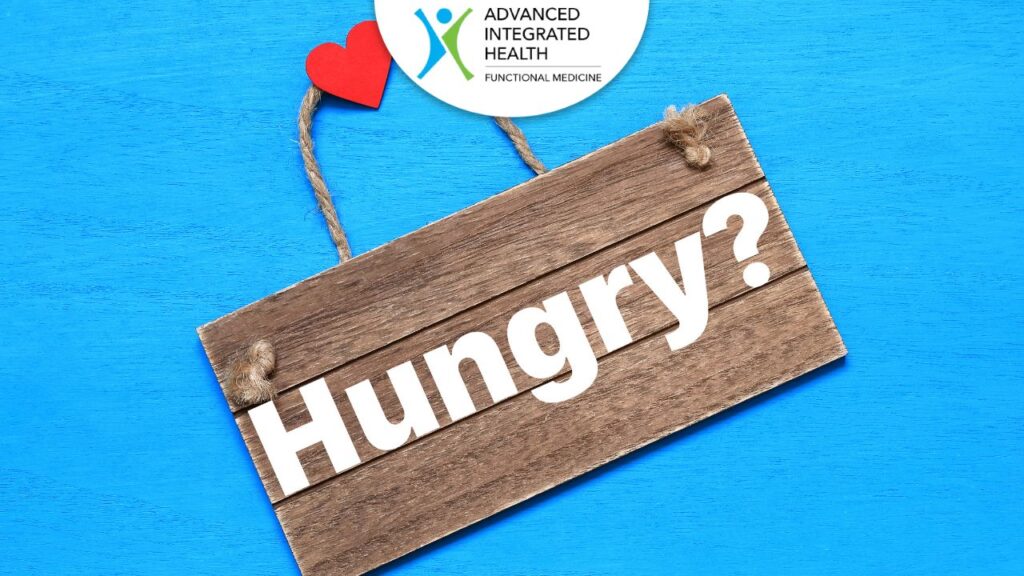You’ve been following your diet plan, exercising regularly, and tracking your calories with precision. Yet the scale refuses to move, and your midsection continues to expand despite your disciplined efforts.
Yes, chronic inflammation causes weight gain. When inflammation persists for weeks or months, it disrupts insulin function, creates leptin resistance (making you constantly hungry), and signals adipose tissue to store more fat, especially around your organs as visceral fat.
In this article, you’ll discover the four biological mechanisms linking inflammation to fat storage, how to identify if inflammation is sabotaging your weight loss, specific blood tests that measure inflammatory markers, and five evidence-based interventions to break the inflammation-weight cycle within 8-12 weeks.
The Science: How Chronic Inflammation Drives Weight Gain
According to a 2025 study published in Immunity & Ageing, persistent systemic inflammation drives weight gain by releasing pro-inflammatory cytokines, chemical messengers that interfere with glucose metabolism, fat accumulation, and appetite control.
This differs from acute inflammation, the temporary immune response to injury that resolves within days. We’re talking about chronic, low-grade inflammatory states triggered by poor dietary factors, chronic stress, gut microbiota imbalance, or underlying medical conditions.
The relationship works both ways: inflammation causes weight gain, and excess adipose tissue produces more inflammatory markers, creating a self-perpetuating cycle.
Four Mechanisms: Insulin Resistance, Leptin Dysfunction, Oxidative Stress, and Cortisol
Here are the four main mechanisms that drive metabolic imbalance and impact overall health:
1) Insulin Resistance and Impaired Glucose Metabolism
When chronic inflammation persists, adipose tissue releases inflammatory cytokines, including TNF-alpha (tumor necrosis factor-alpha) and IL-6 (interleukin-6) into your bloodstream. Cytokines interfere with insulin signaling pathways in muscle, liver, and fat cells, disrupting normal glucose metabolism.
The result is insulin resistance; your cells ignore insulin signals. Blood sugar levels stay elevated, and excess glucose converts to visceral fat around your organs instead of being used for energy.
This represents a hallmark feature of metabolic syndrome. According to Health.com, inflammatory cytokines directly suppress insulin receptor substrate proteins responsible for cellular glucose uptake. The cycle reinforces itself: increased adipose tissue → elevated cytokines → worsened insulin resistance → additional fat accumulation.
2) Leptin Resistance: Why You’re Always Hungry
Leptin is a hormone produced by adipose tissue that signals satiety to your brain’s hypothalamus. Under normal conditions, leptin tells your brain, “Energy stores are sufficient, reduce food intake.”
Chronic inflammation disrupts this pathway.
Pro-inflammatory cytokines like TNF-alpha and IL-6 create leptin resistance at the hypothalamic level. Research published by Health.com confirms this blocks satiety signals even when leptin levels are high. Your brain becomes unable to detect leptin despite abundant circulating levels.
The consequence is paradoxical hunger. Your brain interprets absent leptin signaling as starvation, even when adipose tissue is excessive. This triggers increased appetite, reduced satiety after meals, and enhanced fat storage as your body attempts to compensate for a perceived energy deficit.
This hormonal imbalance explains persistent hunger regardless of caloric intake.
3) Oxidative Stress and Cellular Metabolic Dysfunction
Chronic inflammation generates oxidative stress, an imbalance between free radicals and antioxidants that causes cellular inflammation and damages mitochondrial structures. According to the Immunity & Ageing study, this impairs your cells’ capacity to produce ATP (cellular energy) efficiently.
When cells cannot effectively convert nutrients to energy, your metabolic rate decreases. The same caloric intake that previously maintained your weight now causes weight gain because your body has downregulated energy expenditure.
Additionally, inflammatory cytokines can interfere with thyroid hormone function, further suppressing metabolic rate. This creates a situation where caloric restriction fails to produce expected weight loss because metabolic compensation has occurred.
4) Cortisol-Driven Visceral Fat Accumulation
Systemic inflammation activates your body’s stress response system, resulting in chronically elevated cortisol levels. The 2025 Immunity & Ageing research documents how this stress hormone produces several metabolic changes:
- Increases appetite by elevating ghrelin (hunger hormone) while suppressing peptide YY (satiety hormone)
- Promotes fat accumulation specifically in visceral adipose tissue (abdominal fat deposits)
- Catalyzes muscle protein breakdown, reducing lean body mass and metabolic rate
- Disrupts sleep architecture, creating additional inflammation through sleep deprivation
The stubborn abdominal fat that resists dietary intervention typically reflects cortisol-driven visceral fat accumulation. Visceral adipose tissue is metabolically active and highly inflammatory, releasing additional cytokines that perpetuate the inflammatory cycle.
Gut Microbiota and Lipopolysaccharide-Induced Inflammation
Your gut microbiome, the community of microorganisms in your digestive tract, plays a critical role in inflammation-related weight gain.
Research published in Frontiers in Immunology demonstrates that gut bacteria from individuals with obesity can independently cause weight gain and systemic inflammation when transferred to lean subjects, even without dietary changes. This establishes gut microbiota composition as a causal factor, not merely a correlation. When gut microbiota balance shifts toward inflammatory bacterial species (dysbiosis), intestinal barrier integrity deteriorates.
This increased intestinal permeability (“leaky gut”) allows bacterial lipopolysaccharides (endotoxins) to enter your bloodstream, triggering a chronic immune response and systemic inflammation throughout your body.
This gut-driven systemic inflammation:
- Exacerbates insulin resistance through elevated inflammatory cytokines
- Impairs nutrient absorption and glucose metabolism
- Disrupts hormones regulating appetite and energy storage
- Can trigger or worsen autoimmune diseases in genetically susceptible individuals
Common causes of dysbiosis include ultra-processed foods, antibiotic exposure, chronic psychological stress, sedentary lifestyle, and insufficient dietary fiber.
8 Signs Your Weight Gain Is Inflammation-Related
Consider whether chronic inflammation contributes to your weight gain if you experience three or more of these indicators:
- Persistent weight gain despite caloric deficit. Weight remains stable or increases despite documented caloric restriction and regular exercise, suggesting metabolic dysfunction beyond simple energy balance.
- Disproportionate visceral adiposity. Fat accumulation concentrated in the abdominal region, which proves resistant to targeted intervention.
- Chronic fatigue is unresponsive to rest. Persistent exhaustion even with 7-9 hours of sleep, indicating cellular inflammation disrupting energy production.
- Gastrointestinal dysfunction. Chronic bloating, irregular bowel patterns, or food sensitivities suggest gut microbiota imbalance and intestinal inflammation.
- Musculoskeletal pain. Joint stiffness or pain in multiple locations without acute injury, indicating circulating inflammatory markers.
- Cognitive impairment. Difficulty with concentration or memory (“brain fog”), as inflammation affects neurological function.
- Sleep disturbances. Poor sleep quality despite adequate opportunity. Sleep deprivation itself increases inflammatory markers like interleukin-6.
- A sedentary lifestyle worsens symptoms. Lack of movement compounds inflammation, as physical activity produces anti-inflammatory compounds.
Testing for Inflammatory Markers and Metabolic Dysfunction
Objective measurement of inflammation requires specific blood biomarkers. Request these tests from your healthcare provider:
| Test | Measures | Healthy Range | When to Test |
| hs-CRP | Systemic inflammation levels | <1.0 mg/L (low risk) 1.0-3.0 mg/L (moderate) >3.0 mg/L (high risk) | If you have 3+ symptoms or metabolic syndrome risk factors |
| Fasting Insulin | Insulin resistance severity | 2-20 μU/mL (optimal <10) | Unexplained weight gain with a family history of diabetes |
| Hemoglobin A1c | 3-month average blood glucose | <5.7% (normal) 5.7-6.4% (prediabetes) | Annual screening if overweight or metabolic syndrome |
| Leptin | Leptin levels and resistance | Men: <10 ng/mL Women: <20 ng/mL | Persistent hunger despite adequate food intake |
| TNF-alpha | Pro-inflammatory cytokine levels | <8.1 pg/mL | Confirmed high CRP requiring further investigation |
| IL-6 | Inflammatory cytokines from adipose tissue | <5 pg/mL | Abdominal obesity with metabolic syndrome markers |
High-sensitivity CRP (hs-CRP) provides the most accessible general inflammatory marker and is typically covered by insurance. Values exceeding 3.0 mg/L indicate significant systemic inflammation requiring intervention.
Evidence-Based Anti-Inflammatory Interventions
Reducing chronic inflammation supports weight management, while reducing adipose tissue decreases inflammatory marker production. This bidirectional relationship creates synergistic benefits.
1. Pro-Inflammatory Foods to Eliminate vs. Anti-Inflammatory Foods to Add
| Pro-Inflammatory Foods (Minimize) | Why Inflammatory | Anti-Inflammatory Swap | Active Compounds |
| Refined sugars, high-fructose corn syrup | Spike blood sugar, feed inflammatory gut bacteria | Berries, whole fruits | Anthocyanins, fiber |
| Processed seed oils (soybean, corn, sunflower) | High omega-6 converts to inflammatory eicosanoids | Extra virgin olive oil | Oleocanthal |
| Trans fats (partially hydrogenated oils) | Directly increases inflammatory markers and oxidative stress | Fatty fish (salmon, mackerel, sardines) | Omega-3 fatty acids (EPA/DHA) |
| Ultra-processed foods | Emulsifiers and additives disrupt gut microbiota | Fermented foods (yogurt, kefir, kimchi) | Probiotics |
| Excessive alcohol | Elevates cortisol, stresses the liver | Green tea | EGCG |
| Refined grains (white bread, white rice) | Rapid glycemic response worsens insulin resistance | Leafy greens (spinach, kale) | Polyphenols, magnesium |
Additional anti-inflammatory foods:
- Turmeric with black pepper (curcumin reduces CRP levels; piperine increases bioavailability by 2000%)
- Nuts, especially walnuts (omega-3s, fiber, polyphenols)
Research published in Foods shows that omega-3 fatty acid supplementation significantly reduces chronic inflammation in individuals with obesity. Reducing pro-inflammatory foods by 80-90% produces measurable decreases in inflammatory markers (particularly CRP and IL-6) within 4-6 weeks.
2. Restore Gut Microbiota to Reduce Lipopolysaccharide-Induced Inflammation
Since gut microbiota directly drives weight gain and inflammation independently of caloric intake, gut health restoration represents a critical intervention:
Fiber intake (25-35g daily): Dietary fiber from vegetables, fruits, legumes, and whole grains produces short-chain fatty acids (particularly butyrate) that reduce intestinal inflammation and strengthen gut barrier function, preventing lipopolysaccharide leakage.
Fermented food consumption: Introduces diverse probiotic bacterial strains that compete with inflammatory species and modulate immune function. Elimination protocols: If food sensitivities are suspected, temporary elimination of common triggers (dairy, gluten, eggs, nightshades) followed by systematic reintroduction can identify inflammatory triggers.
Minimize unnecessary antibiotics: While medically necessary antibiotics should never be refused, avoid unnecessary prescriptions that deplete beneficial gut bacteria. Prebiotic supplementation: Inulin, resistant starch, and other prebiotics selectively feed beneficial bacterial species.
Many individuals report reduced bloating and improved energy within 2-3 weeks of gut-focused interventions, with weight loss acceleration following as gut-derived inflammation decreases.
3. Sleep Optimization and Cortisol Management
Both sleep deprivation and chronic psychological stress elevate cortisol levels and increase circulating inflammatory cytokines. Sleep quality (7-9 hours nightly): Even a single night of inadequate sleep measurably increases IL-6 and TNF-alpha levels. Chronic sleep restriction impairs insulin sensitivity and leptin signaling.
Daily stress reduction (15-20 minutes): Meditation, deep diaphragmatic breathing, or nature exposure demonstrably reduces cortisol levels and systemic inflammation. Screen-free period (60-90 minutes before bed): Blue light exposure suppresses melatonin production and fragments sleep architecture.
Individuals who prioritize sleep quality often experience easier weight loss without additional dietary modification, as improved sleep reduces inflammation and restores normal insulin and leptin signaling.
4. Strategic Exercise to Lower Inflammatory Markers
Exercise demonstrates a dose-dependent relationship with inflammation: moderate activity reduces inflammatory markers, while excessive training increases oxidative stress and pro-inflammatory cytokines.
Effective for reducing inflammation:
- 150 minutes weekly moderate cardio (walking, cycling, swimming) at 60-75% max heart rate
- Resistance training 2-3x weekly to preserve muscle and produce anti-inflammatory myokines
- Daily 20-30 minute walks to regulate cortisol and improve gut motility
- 1-2 rest days weekly for inflammatory marker reduction
Avoid (increases inflammation):
- Excessive high-intensity training without adequate recovery
- Training through pain or injury
- Sedentary lifestyle between workouts; break up sitting with movement every 60-90 minutes
Recovery is when your body reduces inflammation and implements metabolic improvements from training stimuli.
Timeline: When Inflammatory Markers Decrease and Weight Loss Begins
| Timeline | What to Expect | Biological Changes |
| Weeks 1-3 | Reduced water retention and bloating; improved energy | Insulin sensitivity begins to recover as pro-inflammatory foods are eliminated |
| Weeks 4-8 | Initial weight loss (4-8 lbs); better sleep and digestion | Insulin resistance improves; leptin signaling starts normalizing |
| Weeks 8-12 | Measurable decreases in CRP, TNF-alpha, IL-6 on blood tests; accelerated fat loss | Inflammatory markers significantly reduced; metabolic rate improving |
| Months 3-6 | Significant progress; hormonal balance restored, sustained fat loss | Leptin resistance reversed; gut microbiota rebalanced; metabolic syndrome markers normalizing |
Individual variation depends on baseline inflammation severity, adherence consistency, presence of underlying conditions, and genetic factors. Most individuals notice clinically meaningful improvements by the 6-8 week mark with consistent implementation.
When to Seek Medical Evaluation for Chronic Inflammation
Certain presentations require medical evaluation beyond lifestyle modification:
- Sudden unexplained weight gain exceeding 10 pounds within one month
- Severe persistent fatigue interfering with daily activities despite adequate sleep
- Polyarticular joint pain with swelling in multiple joints
- Gastrointestinal symptoms with blood in stool
- Persistent weight gain despite 12+ weeks of consistent dietary modification
- Family history of autoimmune diseases or metabolic syndrome
Specific medical conditions produce chronic inflammation requiring pharmaceutical intervention: autoimmune diseases (rheumatoid arthritis, Hashimoto’s thyroiditis, lupus), polycystic ovary syndrome (PCOS), hypothyroidism, and inflammatory bowel disease. These conditions affect the endocrine system and require medical management alongside lifestyle factors.
In some cases, inflammation-related weight gain responds optimally to combined approaches: lifestyle modification plus medication (such as metformin for insulin resistance, or disease-specific treatments for autoimmune conditions).
Frequently Asked Questions
Can inflammation cause sudden weight gain?
Yes, inflammation causes sudden weight gain through water retention (3-7 pounds within days). However, most inflammation-related weight gain develops gradually as chronic inflammation disrupts insulin sensitivity and leptin signaling over weeks, causing actual fat accumulation rather than temporary water weight.
Does reducing inflammation help you lose weight?
Yes, reducing inflammation improves insulin sensitivity and restores leptin signaling, making weight loss easier. Most people notice improved energy within 2-3 weeks and measurable fat loss by week 4-6 as metabolic function normalizes and the body regains the ability to access stored fat.
How do you test for inflammation in your body?
High-sensitivity C-reactive protein (hs-CRP) is the most accessible test, with levels above 3.0 mg/L indicating significant inflammation. Additional tests include fasting insulin, TNF-alpha, IL-6, and hemoglobin A1c. Most insurance covers hs-CRP; comprehensive panels cost $100-300 without insurance.
What foods cause the most inflammation and weight gain?
Refined sugars, high-fructose corn syrup, processed seed oils, trans fats, ultra-processed foods, excessive alcohol, and refined grains cause the most inflammation. These spike blood sugar, worsen insulin resistance, disrupt gut microbiota, and promote visceral fat accumulation. Reducing them by 80-90% decreases inflammatory markers within 4-6 weeks.
Is inflammation weight gain, water retention, or fat?
Both. Initial inflammation causes water retention (3-7 pounds quickly), but chronic inflammation primarily causes visceral fat accumulation through insulin resistance and leptin resistance. Water weight drops within days of reducing inflammation; fat loss takes 4-8 weeks as metabolic function improves and glucose metabolism normalizes.
How long does it take to reduce inflammation naturally?
Initial improvements (less bloating, better energy) appear within 1-3 weeks. Inflammatory markers (CRP, TNF-alpha, IL-6) show measurable decreases at 8-12 weeks. Full metabolic recovery, including normalized insulin sensitivity and leptin signalin,g typically requires 3-6 months of consistent anti-inflammatory diet, sleep optimization, and stress management.
Does inflammation cause belly fat specifically?
Yes, chronic inflammation and elevated cortisol preferentially drive visceral fat accumulation around the abdomen. This visceral adipose tissue releases pro-inflammatory cytokines that perpetuate the inflammation-weight cycle, making belly fat particularly resistant to diet and exercise without addressing underlying inflammatory processes causing metabolic dysfunction.
Can stress cause inflammation and weight gain?
Yes, chronic stress elevates cortisol, which promotes visceral fat accumulation and triggers inflammatory pathways. Cortisol also increases appetite for high-sugar foods and disrupts sleep. Stress management through meditation, adequate sleep, and regular movement reduces both cortisol and inflammatory markers within 4-8 weeks.
Can medication-induced inflammation cause weight gain?
Yes, medications including corticosteroids, some antidepressants, antipsychotics, and beta-blockers can trigger inflammation and weight gain. Corticosteroids particularly cause cortisol-like effects, promoting visceral fat accumulation. Consult your doctor about alternatives or adjunct treatments; never discontinue prescribed medications without medical guidance to avoid serious complications.
Does inflammation cause belly fat specifically?
Yes, chronic inflammation and elevated cortisol preferentially drive visceral fat accumulation in the abdominal region. Visceral adipose tissue wraps around organs and releases additional pro-inflammatory cytokines (TNF-alpha, IL-6) that perpetuate the inflammation-weight cycle, explaining why inflammation-related weight gain manifests as stubborn belly fat.
Wrapping Up
Chronic inflammation causes weight gain through insulin resistance, leptin dysfunction, oxidative stress, elevated cortisol, and gut microbiota imbalance that allows lipopolysaccharides to trigger systemic immune responses.
You can reduce this inflammation by eliminating pro-inflammatory foods, restoring gut microbiome balance, optimizing sleep, and managing stress through daily practices. Give it 8-12 weeks. That’s how long inflammatory markers take to shift and metabolism to adapt. Weight loss follows once you reduce the underlying inflammatory processes driving metabolic dysfunction.
Citations
- https://pmc.ncbi.nlm.nih.gov/articles/PMC12110701/
- https://www.health.com/does-inflammation-cause-weight-gain-11712608
- https://pubmed.ncbi.nlm.nih.gov/38036944/
- https://www.sciencedirect.com/science/article/abs/pii/S0924224424004758

Dr. Bob was born and raised in Florham Park, New Jersey.
He loved the philosophy of vitalism, which teaches about the incredible, innate intelligence of our bodies and its power to self-heal when given the opportunity.



